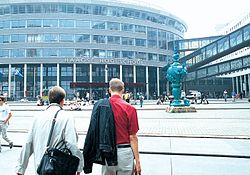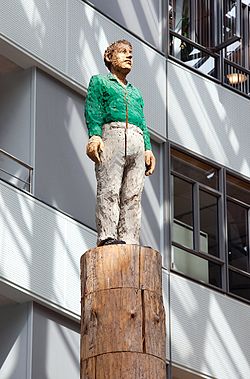- The Hague University
-
The Hague University of Applied Sciences Established 1987[1] Type Public
University of Applied SciencesPresident Rob Brons Admin. staff 1700[1] Students 21,300[1] Location The Hague, Netherlands
52°04′03″N 4°19′27″E / 52.0675°N 4.324167°ECampus The Hague, Delft, Laan van Poot, Zoetermeer Website http://www.thehagueuniversity.nl The Hague University of Applied Sciences (Dutch: De Haagse Hogeschool) is a vocational university in The Hague, Netherlands. It was founded in 1987 as the merger of 14 educational institutions. Since, the university has increased the number of campuses,[citation needed] number of staff and students,[citation needed] and programmes offered.[citation needed]
In 2010, there were approximately 21,300 students[1] studying in the university in different types of programmes offered both in Dutch and English. In these recent years, the university has added at least one English language programme per year.[2] In 2010 the Safety and Security Management Studies was started and in 2011 an Industrial Design Engineering programme. The Hague University has offered 46 full-time bachelor's degree programmes. 21 part-time programmes and 8 dual bachelor's degree programmes at four campuses. The Hague University is currently offering eight English taught bachelor programmes and four English taught master programmes.[3]
Contents
History
On September 1, 1987, The Hague University was founded as a result of a merger of fourteen smaller institutions of higher professional education in the region. In 2003, the Technical University in Rijswijk also became part of this institutional merging. Since 2006, it functioned under the name TH Rijswijk The Hague University of Delft, and in September 2009 it moved to the TU Delft campus. The main building of The Hague University is located behind the Hollands Spoor station in The Hague.
The Hague University is deeply rooted in the city of The Hague, in its capacity as a hub for knowledge, economics, legal and administrative authority and international business.
Mission and Vision
The main mission of The Hague University is to give students the opportunity to develop their talents to the greatest possible extent through the provision of high-quality, innovative professional education. Its main vision operates on the strategic core values of focus on students, focus on the environment, focus on innovation and focus on quality. The threefold motto of the board is developing talent, commitment and experience.
Accreditation
Most of the international programmes (English taught programmes) are accredited by CROHO or NVAO with the exception of international semesters or Preparation courses. NVAO (in Dutch: Nederlands-Vlaamse Accreditatieorganisatie) is the educational accreditation organisation of the Netherlands and Flanders. Established by international treaty its purpose is to ensure the quality of higher education in the Netherlands and Flanders by accrediting study programmes.
The university along with many other Dutch educational institutions uses the European Credit Transfer System (ECTS). In this system, 60 study credits represent one year of study and one study credit represents 28 hours of study. A year of study is 24 weeks.
Source: http://en.wikipedia.org/wiki/Nvao
Campus
The Hague University of Applied Sciences has its campuses located in four locations.
Central Campus – The Hague
Following a competition among four architects, the university opted for PRO atelier’s design (architects: Hans van Beek and Leon Thier). This design optimally complies with the university’s demands:- Adaptable, to meet growth and shrinkage
- The building complex should not be characterised by ‘massiveness’
- Study faculties should have their own location and identity inside the building
- An open character towards the city
The different parts of the building have been given special names such as Ovaal, Slinger, Strip and Rugzak (Oval, Pendulum, Strip and Backpack). The shape and location makes the Oval the most central of the building: ‘the heart’. The inner square is a meeting point for students, staff and lecturers. Life on campus revolves around the magnificent oval atrium hall, with its soaring glass ceiling. The main entrance adjacent to it is also the only way in and out of the building. All international programmes are taught here. The Hague University has occupied this building since August 1996.
- Campus in The Hague
The campus is entirely surrounded by water, a kind of city within a city. It is located right at the back of Holland Spoor station, three minutes walk to Megastores – a big shopping mall of The Hague and just a few kilometres away from the city centre.
Arts in the campus
At the start of development, the University decided to provide finance for purchasing expressive art for the building. The university now possesses various sculptures and photographic collections. There are works of art dotted all over our campus – paintings, sculptures and photographs. Art is purchased mainly from young artists but based on the one central theme of man and his environment. Throughout the school, The Hague History collection is able to be seen. It is a sizeable modern art collection which adds something quite special to the atmosphere on campus.Library
The central library in The Hague campus is amongst the largest universities’ libraries in the Netherlands. It opens every weekday, Monday to Thursday from 9 a.m. to 9 p.m. (10 p.m. applies to study places on the first floor) and Friday from 9 a.m. to 6 p.m.[4] The library facilities include electronic catalogues with descriptions of all resources; tables for both group and individual studies. It provides 400 study areas plus 50 study areas with PCs and internet connection. In addition to borrowing, browsing and studying various information sources, students can also use the digital library (at home) to access various catalogues, databanks and other digital sources.
- Centre library
Delft Campus - Delft
The Delft Campus has the surface of 15,000 m2 and 4,000 m2 parking roof. It was constructed from December 2007 till July 2009 and cost about € 24 million. This is the house of 1,800 students and 120 staff. Energy Performance Coefficient (EPC) of this building is only 33 percent of the legal standard.[5]The Delft campus is an ideal environment for high quality technical education. The Academy for Technology, Innovation and Society Technology and the Academy of ICT & Media are located here. The building scored so high in term of sustainability that even before the official opening, it won the energy prestigious trophy of the NET: Trophy for the Energy saving. The building construction adhered to the four principles: durability, appearance, flexibility and transparency.
Zoetermeer Campus - Zoetermeer
Laan Van Poot Campus - The HagueAcademics
Academies:
- Accounting & Financial Management Academy
- European Studies & Communication Management Academy
- Facility Management Academy
- Healthcare Academy
- ICT & Media Academy
- Management & Human Resources Academy
- Marketing & Commerce Academy
- Masters & Professional Courses Academy
- Primary Education Teacher Training Academy
- Public Administration, Law and Safety Academy
- Social Professions Academy
- Sports Studies Academy
- Technology, Innovation & Society Academy
In 2009 The Hague University of Applied Sciences offered 46 full-time bachelor’s degree programmes at four campuses in the fields of economics, healthcare, behaviour and society, computer technology, education, and technology. Currently, there are eight programmes offered in English at the undergraduate level:- International Business and Management Studies
- International Communication Management
- International & European Law
- International Public Management
- Process & Food Technology
- European Studies
- Safety and Security Management Studies
- Industrial Design Engineering
In 2009, the Academy for Master’s & Professional Courses (M&PC) offered seven master’s degree programmes in Dutch, with a total of around 150 enrolments. From 2011, four English-language master’s degree programmes will be available for enrolments:
- Master in Accounting and Control
- Master in European Law and Policy
- Master in International Communication Management
- Master of Business Administration
The university along with many other Dutch educational institutions uses the European Credit Transfer System (ECTS). In this system, 60 study credits represent one year of study and one study credit represents 28 hours of study. A year of study is 24 weeks.
English taught bachelor programmes offer students an opportunity to do one or two exchange semesters abroad in partner universities as well as welcoming other students coming for international semesters at the universities.
Research
Research areas at The Hague University addresses multidisciplinary issues that cannot be resolved by means of standard knowledge or routines and take into account current social issues and important regional developments.
Research Area Research Area Citizenship and Diversity Department for Psycho Geriatrics Energy and the Built Environment Entrepreneurship and Innovation European Public Management Human Resources Management Cyber Safety & Security Information, Technology and Society Innovative Exercise Stimulation and Sports International Cooperation Knowledge Transfer in Product Innovation Metropolitan Development Pedagogy of Vocational and Professional Development Philosophy and Professional Practice Revalidation Science & Technology Knowledge Infrastructure Sustainable Talent Development for Teachers Youth and Development Youth and Lifestyle Change Student Profile
The Hague University of Applied Sciences grew by a substantial number of students in 2009. In total, the student body numbered around 20,300, up from 19,600 in 2008. The students are from more than 135 different nationalities, making The Hague University the most international universities in Holland.
In 2009, around 48% of all students at The Hague University of Applied Sciences were graduates of senior general secondary education (havo), 27% of senior secondary vocational education (mbo) – and 9% of university preparatory education (vwo). The number of students holding a foreign diploma has been on the rise for several years, from 5% of all enrolees in 2005 to 8% in 2009, and from 5% of all incoming students in 2005 to 10% in 2009. Disciplines of the student body
Discipline Percentage over total number of students Economics 49.9% Technical 23.5% Behaviour and Society 13% Healthcare 6.8% Education 6.8%
Ethnicity of the student bodyEthnic Percentage over total number of students Dutch 48% Western (large share of Bulgarian, German, Polish) 11% Non Western (large share of Chinese, Netherlands Antilles, Moroccan, Turkish, Surinamese) 31% Student life
International students’ associations
Interaccess
Interaccess is an organisation for - and by international students of The Hague. The organisation is a fairly new initiative of students and staff from The Hague University. All international students in The Hague are considered and approached as one group. Interaccess wants to improve contacts between international students together and the other students from The Hague.
Interacces organizes activities for all international students such as guest speakers, discussions, presentations, festivals, trips, etc. In the weekend activities will be organized as: trips, (bicycle) excursions, poker tournaments, parties, etc.
ACKU
ACKU Cultural Office was established in 2002 with the mission of making the city of The Hague more attractive to its students by organizing cultural events, going out and helping students organize their own project. The services of ACKU are intended for all students within the city including students of The Hague University. Together with the students, ACKU organises intercultural interesting activities.
Agorà Student Union
Agorà Student Union was independently established on April 18th 2010 by a group of student of the International Public Management programme of The Hague University as a Union for international students. It is the only one of its sort within the Netherlands. The goals of the organizations are multifold, centered around the improvement of the educational conditions of its member base, and based on the principles of autonomous self-determination. The founding documents of the Union are its Constitution, its Bill of Rights and its Statement of Intent. The philosophical disposition of the organization is clearly stated in the latter, and specifies that:
"...is based upon the precept that those who are being instructed in public tertiary educational institutions have the right to determine the way their experience at such institutions can be improved. The way through which decisions are reached is based on consensus and democracy. The Union is a non-profit and non-partisan organization which will strive to operate with absolute transparency and accountability."[6]
Agorà Student Union differs from other organizations within the institution as it does not merely organize social activities, but actively strives to protect and promote the rights and wishes of its body of members. Decisions are reached through democratic consensus in open and public plenary sessions which are held bi-weekly, and enforced by a Board of Supervisors which publicly meets twice a week.
Student's TV channel - H/TV
The Hague University’s TV is broadcasting for and by students at The Hague University. The movies have always created a relationship with The Hague University in the broad sense. H/TV serves as a visualised means by recording activities and developments taking place within / connected to the university. The editorial staffs consist of students who study minor 'Crossmedia Communications'. They think the programming and make reports, videos and news. Videos can be viewed on the video wall in the Atrium, on screens in the restaurant, on the H/TV’s website and on YouTube. The movies are very diverse and always have to do with The Hague University. It may be a report of a special internship, the argument of the day with feedback from students, student of the week, a symposium, a special lecture, a student of the party. There are solid program items such as: A day out of the life of .., Got Talent, Cribs and many more.
The Hague Academic Coalition
The Hague Academic Coalition is a consortium of academic institutions in the fields of international relations, international law and international development. The HAC cooperates closely with the Municipality of The Hague, the Province of South Holland, the Dutch Raad voor de Rechtspraak, and the Dutch Ministry of Foreign Affairs. The HAC seeks to support the work of the various international courts, tribunals and national or international organisation based in the Hague such as the ICC, the ICTY, the OPCW. It further promotes cooperation with academic agencies in the Hague and the Netherlands or promoting international cooperation elsewhere in the world. It develops the promotion of scholarly and policy-orientated research as well as consultancy activities. It holds public events, lectures and conferences.
References
- ^ a b c d "Quick Facts". The Hague University of Applied Sciences. 2009. http://www.thehagueuniversity.com/about-us/quick-facts. Retrieved 26 October 2010.
- ^ "Our education". The Hague University of Applied Sciences. 2009. http://sites.dehaagsehogeschool.nl/jaarverslag_2009/english/our-education. Retrieved 26 October 2010.
- ^ "Our Programmes". The Hague University of Applied Sciences. 2009. http://www.thehagueuniversity.com/about-us/programmes. Retrieved 26 October 2010.
- ^ "Our Facilities - Library". The Hague University of Applied Sciences. 2010. http://www.thehagueuniversity.com/about-us/our-facilities/library. Retrieved 27 October 2010.
- ^ "Annual Report 2009 - New Campus in Delft". The Hague University of Applied Sciences. 2009. http://sites.dehaagsehogeschool.nl/jaarverslag_2009/nieuwbouw-delft. Retrieved 27 October 2010.
- ^ http://www.scribd.com/doc/47964589/Agora-Student-Union-Statement-of-Intent
External links
- (English) The Hague University of Applied Sciences official website
- (Dutch) De Haagse Hogeschool officiële website
- (English) INTERACCESS official website
- (Dutch) ACKU officiële website
- (Dutch) H/TV Channel officiële website
Coordinates: 52°04′03″N 4°19′27″E / 52.0675°N 4.32417°E
Vocational Universities in the Netherlands Amsterdam School of the Arts | Artez | Avans | CAH Dronten | Christelijke Hogeschool Ede | Codarts | De Kempel | Design Academy Eindhoven | Driestar Hogeschool | Edith Stein University | Fontys | Gereformeerde Hogeschool | Gerrit Rietveld Academie | The Hague University | Hanze University Groningen | HAN University | HAS Den Bosch | Helicon University | Hogeschool van Amsterdam | Hogeschool Zeeland | Hotelschool The Hague | HU Utrecht | Inholland University | IPABO | Iselinge Educatieve Faculteit | Katholieke Pabo Zwolle | Maastricht Academy of Music | Marnix Academie | NHL University | NHTV Breda | Rotterdam University | Royal Academy of Art | Saxion Hogeschool | Stenden University | Stoas University | University of Leiden | Utrecht School of the Arts | Van Hall Larenstein | Windesheim | Zuyd University
Categories:- Vocational universities in the Netherlands
- Educational institutions established in 1987
- Organisations based in The Hague
Wikimedia Foundation. 2010.



















